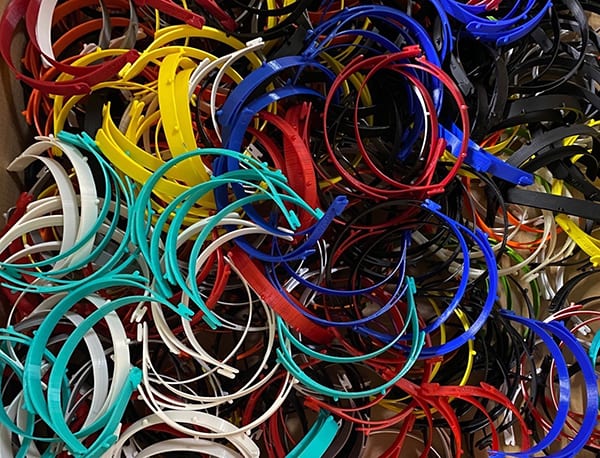
SUNDERLAND, England — Nissan is stepping up to help in the battle against the COVID-19 pandemic that is sweeping the globe.
Nissan supply chain experts are lending a hand to get hundreds of thousands of protective face visors to frontline workers.
A team of volunteers have created a parts processing line in the final assembly area at the company’s Sunderland Plant to sort thousands of individual visor parts and pack them in sets of 125 for shipping direct to the England’s National Health Service.
More than 77,000 visors will leave the plant by the end of this week, with up to 100,000 being distributed each week, from next week.
In the first phase of the project, the team took delivery of hundreds of boxes of visor parts from volunteers from across the country who have been using their 3D printers to make the PPE.
“It’s great to be able to play our part in helping to provide the NHS with these visors,” said Adam Pennick, Nissan’s Production Director. “Our people are experts in the logistics behind an effective supply chain, and we certainly weren’t short of volunteers for this project.”
The project was inspired by four brothers, two of whom, Anthony and Chris Grilli, are engineers based at Nissan’s Technical Centre in Cranfield, Bedfordshire. Production was initially kicked off with the support of crowd funding and used banks of 3D printers at the Grillis’ homes.
“We had the ability to support the national effort to produce more PPE for frontline health workers and we just had to help,” said Anthony Grilli. “We quickly mobilized to produce parts using our 3D printing capability at home and we’re grateful to everyone that donated through our crowd funding site to help us get this going.”
Nissan has provided funds for an injection moulding tool that increases the number of parts produced, which are now being sourced from companies in Lancashire, Coventry and Gateshead. Injection moulding provides a faster way to produce the plastic parts needed and has ramped up the volume.
The visors are made up of three individual parts: an elastic headband, frame, and see-through visor. These parts are sent to Nissan for packing and distribution in a ready-to-assemble format to an NHS procurement centre. The visors are shipped in this format at the request of the NHS to minimise damage risk during transit, and to ensure the maximum volume can be dispatched at once.
All four of the Grilli brothers are continuing to 3D print face visors at home and are supplying to local care facilities and hospices.
In addition, Hospital de Sant Pau, the engineering company QEV Technologies, along with Nissan and the technology centre Eurecat have developed the Q-Vent respirator, to be used in hospitals throughout the world.
The accessible, flexible and reliable design meets international specifications, meaning it can be supplied to developing countries in the fight against COVID-19.
The Q-Vent has already been authorised by the Spanish Agency for Medicines and Health Products and has been tested in the facilities of the Research Institute of the Hospital de Sant Pau – IIB Sant Pau in Barcelona with excellent results. The first 20 units will be donated to the local health authority CatSalut for use in ICUs and ongoing clinical study to optimize the equipment.
“Since the beginning of the epidemic, we assumed the challenge of developing a low-cost portable system that could reach all corners of the world, especially those emerging countries where the Covid-19 was going to cause a great damage and where the majority of the patients were not going to have access to respirators. And thanks to everyone’s effort and desire, this has been possible,” explains Miguel Valldecabres, CEO at QEV Technologies.
“From Sant Pau we support this initiative to fight against COVID-19. We believe it is necessary to help emerging countries that have lower economic capacities than we have in Europe and that’s why we support the QEV Technologies project to make this respirator useful in ICUs anywhere in the world,” confirms Dr. José M. Guerra, scientific coordinator of the project, doctor of the Arrhythmia Unit of the Hospital de Sant Pau and Coordinator of the Research Group in Clinical and Translational Cardiology, of the Research Institute of this centre.
Manufacturing the Q-Vent will begin this week at Nissan Barcelona Plant’s Powertrain Plant, with a capacity of 180 units per day, depending on orders.
Eurecat has been in charge of advising on the design of components and the production of some of them, as well as managing the process for the inclusion of hospitals in the clinical study.
